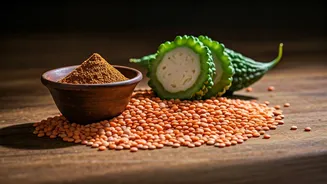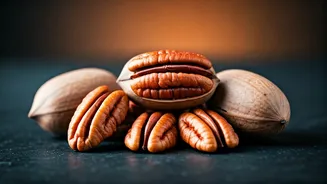Lentils: Steady Comfort
Lentils stand out as a valuable addition to your diet for managing blood sugar. These small but mighty legumes provide a steady release of energy, which
helps prevent sharp spikes in blood sugar levels. They are rich in fiber, which slows down the digestion and absorption of carbohydrates, ensuring a more gradual rise in blood glucose. Moreover, lentils are a source of protein and essential nutrients, contributing to overall health and satiety. Including lentils in meals, whether in soups, salads, or as a side dish, is a simple yet effective strategy to maintain stable blood sugar levels. They are also easily incorporated into the diet, making them a practical choice for those looking to manage their health.
Cinnamon: Warm Balance
Cinnamon, a common spice found in many Indian kitchens, offers a warm nudge toward balanced blood sugar levels. Studies have shown that cinnamon can enhance insulin sensitivity, making it easier for the body to utilize glucose. This spice works by mimicking the effects of insulin, allowing cells to absorb sugar more effectively. Incorporating cinnamon into your diet is easy; it can be sprinkled on oatmeal, added to coffee, or used in various recipes. Regular consumption of cinnamon, as part of a balanced diet, can contribute to improved blood sugar control. However, it's important to remember that cinnamon is a complementary tool, and should be used alongside other healthy lifestyle choices.
Bitter Gourd: Acquired Remedy
Bitter gourd, also known as karela, may have an acquired taste, but it's a potent remedy for blood sugar management. This vegetable contains compounds that have been shown to help lower blood glucose levels. Bitter gourd can improve glucose uptake and utilization by cells, similar to the action of insulin. It can be consumed in various forms, such as juice, cooked vegetables, or capsules. While its bitter flavor may not be to everyone's liking, the health benefits make it a worthwhile addition for those aiming to manage their blood sugar. Regular consumption, as part of a comprehensive dietary plan, may yield noticeable improvements in blood sugar control.
Amla: Sour Clarity
Amla, also known as Indian gooseberry, offers sour clarity for the pancreas and blood sugar regulation. Rich in vitamin C and antioxidants, amla supports overall health. It is believed to have properties that help regulate blood sugar levels. Amla can enhance insulin sensitivity, improving glucose uptake. It can be consumed raw, in juice form, or as a supplement. Integrating amla into your daily routine provides a natural way to support blood sugar management. Regular intake, as part of a well-balanced diet and lifestyle, may lead to improvements in blood sugar control and overall metabolic health.
Fenugreek: Small Changes
Fenugreek seeds, tiny but mighty, have a significant impact on blood sugar management. These seeds contain soluble fiber that slows down the absorption of sugar, preventing spikes. They also improve insulin function and glucose tolerance. Fenugreek can be consumed in various forms, including whole seeds, ground powder, or capsules. Adding fenugreek to your diet is relatively simple; it can be soaked overnight and consumed in the morning, added to curries, or used as a spice in cooking. Incorporating this small seed can play a significant role in maintaining stable blood sugar levels over time. As part of a healthy lifestyle, fenugreek can support long-term metabolic health.
Oats: Slow Rhythm
Oats provide a slow and warming rhythm for your body by helping in regulating blood sugar levels. Oats are a great source of soluble fiber, which slows down the digestion and absorption of carbohydrates. This helps prevent sudden spikes in blood sugar. The gradual release of glucose ensures more stable blood sugar levels throughout the day. Oats can be consumed in various ways, such as oatmeal, porridge, or added to smoothies. Incorporating oats into your regular diet can be a straightforward way to support blood sugar control. They provide sustained energy and can contribute to overall well-being. Consuming oats regularly can be a part of a balanced diet, which can help manage your health.
6 Blood Sugar Foods
In addition to the foods mentioned earlier, there are other foods that also help in blood sugar regulation. These include foods like non-starchy vegetables such as spinach, kale, and broccoli. These are low in carbohydrates and high in fiber, which aids in stable blood sugar levels. Fatty fish like salmon and mackerel, are rich in omega-3 fatty acids, help improve insulin sensitivity. Nuts and seeds, like almonds and chia seeds, provide healthy fats and fiber, that supports blood sugar balance. Berries, which are low glycemic index fruits, help maintain blood sugar levels without any major spikes. By including these foods in your daily meals, you can create a comprehensive dietary plan for managing your blood sugar.
14-Day Dietary Plan
To effectively manage your blood sugar over 14 days, consider these dietary strategies. Start by building meals around whole, unprocessed foods like the ones mentioned in this article. Ensure each meal contains a good balance of protein, fiber, and healthy fats to slow down carbohydrate absorption. Eat regular meals and avoid skipping meals, as this can lead to blood sugar fluctuations. Practice portion control, especially with carbohydrate-rich foods. Drink plenty of water throughout the day to stay hydrated and support overall health. Regular monitoring of your blood sugar levels can help you assess the effectiveness of your dietary changes. It is also important to consult a healthcare professional for personalized guidance.












